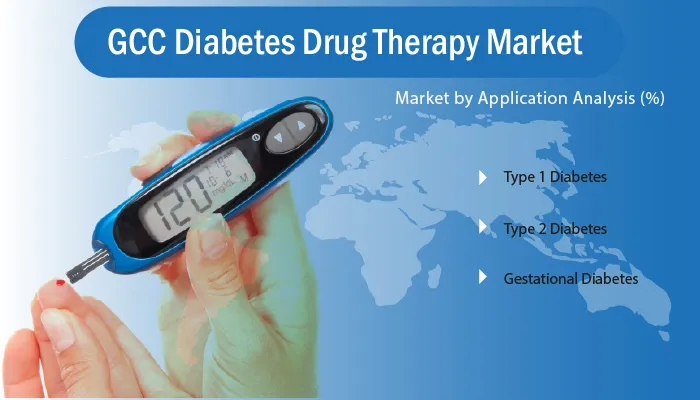GCC Diabetes Drug Therapy Market (Service Type - Insulin, Biguanides, Meglitinides, Sulfonylureas, Inhibitors, and Others; Application - Type 1 Diabetes, Type 2 Diabetes, and Gestational Diabetes): Industry Analysis, Trends, Size, Share and Forecasts to 2027
A recent report published by Infinium Global Research on the GCC diabetes drug therapy market provides in-depth analysis of segments and sub-segments in the GCC as well as regional GCC diabetes drug therapy market. The study also highlights the impact of drivers, restraints, and macro indicators on the GCC and regional GCC diabetes drug therapy market over the short term as well as long term. The report is a comprehensive presentation of trends, forecast and dollar values of GCC diabetes drug therapy market. According to the report, the GCC diabetes drug therapy market is projected to grow at a CAGR of xx% over the forecast period of 2021-2027.

Market Insight
The number of people with type 2 diabetes in the countries of the Gulf Cooperation Council (GCC) has dramatically increased in the past two decades and is expected to increase in the future. The GCC countries are in the midst of a health crisis. Close to 20% of the region’s population is suffering from diabetes, particularly type 2 diabetes. The diabetes devices and drugs include several devices and drugs that help in the monitoring and treatment of diabetic patients. Monitoring glucose levels is an essential part of diabetes management or treatment.
Rapidly increasing incomes of the people in GCC countries have led to a gradually sedentary lifestyle and a move to Western-style diets laden with sugar. This poses a substantial economic cost to the GCC, primarily in the form of increased healthcare expenditure to treat diabetes. the rapid economic development is the main cause for diabetes being one of the most prevalent chronic noncommunicable diseases in the GCC countries. The economic development has led to major lifestyle modifications manifested by the tendency to a westernized diet, less physical activity, obesity, and an increase in smoking habits. Three countries from the GCC states were ranked among the top countries with a high prevalence of diabetes, namely the Kingdom of Saudi Arabia, Kuwait, and Qatar. Diabetes Prevalence increases from age 18 and peaks around age 65 years (almost 25% in women). Women have a higher diabetes prevalence than men in this region. However, health expenditure on diabetes is still less than what is needed in the GCC countries, in spite of the increase in its demand. Moreover, raising awareness about diabetes and diabetes management among patients is anticipated to provide growth opportunities to the diabetes drug therapy market in the near future. The COVID-19 pandemic has caused serious disruptions to the healthcare system and has revealed substantial healthcare disparities. The hospitals gave preference to COVID-19 cases over patients with other less-severe health conditions. Thus, the number of procedures performed on diabetes health conditions fell rapidly during the pandemic. This decreased the demand for medical devices and drug supplies required for such procedures. However, COVID-19 is expected to be an opportunity for the diabetes devices and drug market, as the patients having diabetes are at a higher risk of getting COVID-19 infection.
Geographically, Saudi Arabia holds the largest market share in the GCC diabetes drug therapy market. The rising diabetes prevalence with the number of government and private health services in Saudi Arabia is high in all other GCC countries in hospital beds. In addition, Saudi Arabia and United Arab Emirates (UAE) have the highest diabetes prevalence in the Gulf region. Recently, all the GCC countries have put more weight on establishing diabetes centers that will serve as secondary or tertiary healthcare levels.
Segment Covered
The report on GCC diabetes drug therapy market covers segments such as service type, and application. On the basis of service type, the sub-markets include insulin, biguanides, meglitinides, sulfonylureas, inhibitors, and others. On the basis of application, the sub-markets include type 1 diabetes, type 2 diabetes, and gestational diabetes.
Companies Profiled:
The report provides profiles of the companies in the market such as Becton Dickinson, AstraZeneca, F. Hoffmann-La Roche AG, Medtronic plc, DexCom, Inc, Abbott Laboratories, and Other Companies.
Report Highlights:
The report provides deep insights into the demand forecasts, market trends, and micro and macro indicators. In addition, this report provides insights into the factors that are driving and restraining the growth in this market. Moreover, The IGR-Growth Matrix analysis given in the report brings an insight into the investment areas that existing or new market players can consider. The report provides insights into the market using analytical tools such as Porter's five forces analysis and DRO analysis of GCC diabetes drug therapy market. Moreover, the study highlights current market trends and provides forecast from 2021-2027. We also have highlighted future trends in the market that will affect the demand during the forecast period. Moreover, the competitive analysis given in each regional market brings an insight into the market share of the leading players.
